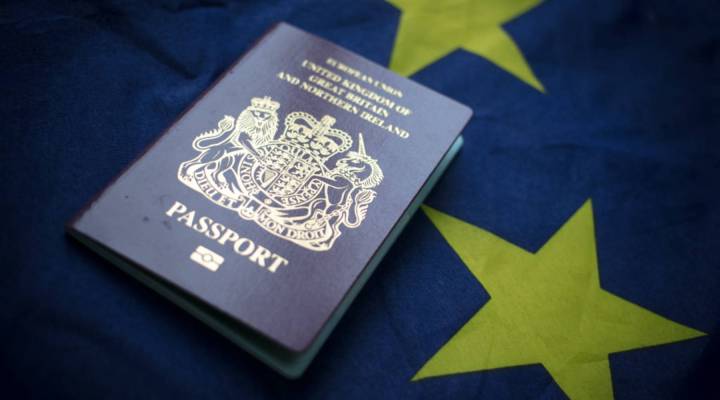
Purple faces over Britain’s new blue passports

The UK is planning to mark its departure from the European Union by discarding the burgundy colored EU passport that has been issued to British citizens since the 1980s. Instead, from October next year, the UK will revert to the traditional British blue and gold document. The government has trumpeted the move as symbolically important: a clear sign that the UK is regaining its independence after more than 40 years of EU membership. But the plan has provoked a furor because the contract to produce the new passport might be taken away from a British company and given to a firm in continental Europe. One Brexit supporting politician called it “a national humiliation.” Another said it was disgraceful and “symbolically bad.”
The company that stands to lose the contract, De La Rue — a 200-year-old British company in spite of its French name — designs and supplies passports and bank notes for dozens of countries around the world, including Britain. De La Rue’s chief executive Martin Sutherland spoke of his shock and dismay when he learned that his bid to produce the new post-Brexit British passport was likely to be rejected in favor of a Franco-Dutch supplier.
“The new, blue passport is supposed to be an icon of British identity,” he said. “But now this icon of British identity is going to be manufactured in France.” De La Rue could be losing more than a $700 million contract. Sutherland said the decision has damaged the company’s international reputation as an export success story and hobbled its chances of fully exploiting all the free trade opportunities that Brexit could bring.
“I think the British government should be supporting British business in the post Brexit world. It should be helping us to ply our trade around the world. And this decision doesn’t do that,” Sutherland said.
But the British government pointed out that the UK is still bound by European Union procurement regulations and that the Franco-Dutch bid significantly undercut De la Rue’s, saving UK taxpayers $170 million.
Richard Tice — a pro-Brexit property magnate — welcomed the saving.
“That’s a lot of money that one can invest in public services,” Tice said, adding that the whole point about Brexit is to be free of protectionism.
“We’re advocating free markets, we’re advocating an outward-looking, global Britain and we should welcome open competition,” he said.
He accused De La Rue of trying to have its cake and eat it, a charge frequently levelled at supporters of Brexit. Tice said the company was trying to “have it both ways” by demanding that Britain keep its passport production at home while at the same time urging foreign governments to farm theirs out to a British company.
Nevertheless, De La Rue’s complaint has struck a nerve and, following the public and political outcry, the UK government has postponed a final decision on the contract.
There’s a lot happening in the world. Through it all, Marketplace is here for you.
You rely on Marketplace to break down the world’s events and tell you how it affects you in a fact-based, approachable way. We rely on your financial support to keep making that possible.
Your donation today powers the independent journalism that you rely on. For just $5/month, you can help sustain Marketplace so we can keep reporting on the things that matter to you.












